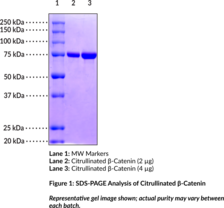Territorial Availability: Available through Bertin Technologies only in France
- Correlated keywords
- CTNNB 1 GSK 3? CK 1 PAD 2 Apc min EVR 7 ?1 MRD 19 Cadherin-Associated Beta1
- Product Overview:
?-Catenin is a transcriptional coactivator that is encoded by the CTNNB1 gene in humans.{46678,11345} It is a 781-amino acid protein comprised of an N-terminal domain containing glycogen synthase kinase 3? (GSK3?) phosphorylation sites, a C-terminal transactivation domain, and a central domain spanning amino acid residues 138-664.{46679,46680} The central domain consists of 12 armadillo repeats and is required for binding to cadherins, TCF/LEF transcription factors, and adenomatous polyposis coli (APC). ?-Catenin has roles in cell adhesion, canonical Wnt signaling, regulation of stem cells, embryonic development, and adult tissue homeostasis, among others.{46679,46678} In the absence of Wnt, a complex consisting of axin, APC, GSK3?, and casein kinase 1 (CK1), binds to and phosphorylates ?-catenin, targeting it for ubiquitination and proteasomal degradation.{46678} In the presence of Wnt, phosphorylation of ?-catenin is inhibited, allowing ?-catenin to translocate into the nucleus, where it interacts with TCF/LEF to activate expression of Wnt target genes. Activating mutations in CTNNB1 that stabilize ?-catenin have been associated with a variety of cancers, including hepatocellular and adrenocortical carcinomas, colorectal cancer, and pilomatricomas.{46681,46680,17947,26670} Citrullination of ?-catenin by protein arginine deiminase 2 (PAD2) induces proteasomal degradation of ?-catenin thus preventing Wnt signaling.{45863} PAD2 citrullination of ?-catenin induced by the antiparasitic agent nitazoxanide (Item No. 13692) reduces the levels of ?-catenin in tumor tissue from Apcmin/+ mice, a model of intestinal adenomatous polypsis, and decreases the number of adenomas.
Cayman Chemical’s mission is to help make research possible by supplying scientists worldwide with the basic research tools necessary for advancing human and animal health. Our utmost commitment to healthcare researchers is to offer the highest quality products with an affordable pricing policy.
Our scientists are experts in the synthesis, purification, and characterization of biochemicals ranging from small drug-like heterocycles to complex biolipids, fatty acids, and many others. We are also highly skilled in all aspects of assay and antibody development, protein expression, crystallization, and structure determination.
Over the past thirty years, Cayman developed a deep knowledge base in lipid biochemistry, including research involving the arachidonic acid cascade, inositol phosphates, and cannabinoids. This knowledge enabled the production of reagents of exceptional quality for cancer, oxidative injury, epigenetics, neuroscience, inflammation, metabolism, and many additional lines of research.
Our organic and analytical chemists specialize in the rapid development of manufacturing processes and analytical methods to carry out clinical and commercial GMP-API production. Pre-clinical drug discovery efforts are currently underway in the areas of bone restoration and repair, muscular dystrophy, oncology, and inflammation. A separate group of Ph.D.-level scientists are dedicated to offering Hit-to-Lead Discovery and Profiling Services for epigenetic targets. Our knowledgeable chemists can be contracted to perform complete sample analysis for analytes measured by the majority of our assays. We also offer a wide range of analytical services using LC-MS/MS, HPLC, GC, and many other techniques.
Accreditations
ISO/IEC 17025:2005
ISO Guide 34:2009
Cayman is a leader in the field of emerging drugs of abuse, providing high-purity Schedule I-V Controlled Substances to federally-licensed laboratories and qualified academic research institutions for forensic analyses. We are certified by ACLASS Accreditation Services with dual accreditation to ISO/IEC 17025:2005 and ISO Guide 34:2009.





